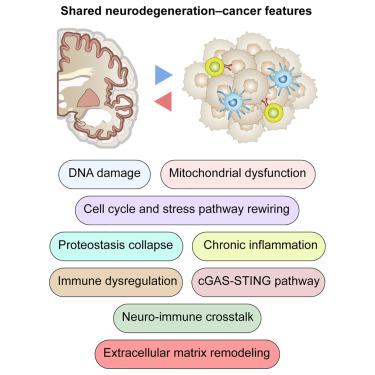Neurodegeneration rewires the tumor microenvironment via the neuro–immune–cancer axis
IF 4.1
2区 综合性期刊
Q1 MULTIDISCIPLINARY SCIENCES
引用次数: 0
Abstract
Neurodegeneration and cancer, long considered opposing processes, neuronal loss versus uncontrolled proliferation, are increasingly recognized as mechanistically convergent. This review reframes the field by positioning neurodegeneration as an active driver of tumor evolution. Integrating insights from multi-omics, spatial transcriptomics, and neuroimmune–microbiota studies, we show how degenerating neurons disrupt DNA repair, mitochondrial function, immune regulation, and barrier integrity, thereby creating tumor-permissive niches. Particular emphasis is placed on the enteric nervous system, where neuronal loss promotes colorectal and pancreatic cancers through immune suppression and microbial dysbiosis. Shared molecular regulators, including p53, Pin1, STING, and the Biglycan–IL-10–microbiota axis, exhibit dual roles, pro-apoptotic in neurons yet pro-survival in tumors, highlighting context-dependent biology. We propose a mechanistic, target-based therapeutic classification that transcends disease boundaries. Recognizing neurodegeneration as a tumor-promoting process uncovers novel diagnostic and therapeutic opportunities, expanding cancer neuroscience beyond its current paradigm.

神经变性通过神经-免疫-癌症轴重新连接肿瘤微环境
神经退化和癌症,长期以来被认为是对立的过程,神经元损失和不受控制的增殖,越来越多地认识到在机制上趋同。这篇综述通过将神经退行性变定位为肿瘤进化的积极驱动因素来重新构建该领域。整合多组学、空间转录组学和神经免疫微生物群研究的见解,我们展示了退化的神经元如何破坏DNA修复、线粒体功能、免疫调节和屏障完整性,从而创造肿瘤允许的生态位。特别强调的是肠神经系统,在那里神经元损失通过免疫抑制和微生物生态失调促进结直肠癌和胰腺癌。共享的分子调节因子,包括p53、Pin1、STING和biglycan - il -10微生物群轴,表现出双重作用,在神经元中促进凋亡,在肿瘤中促进生存,突出了环境依赖性生物学。我们提出一种机制的、基于靶标的治疗分类,它超越了疾病的界限。认识到神经退行性变是一个肿瘤促进过程,揭示了新的诊断和治疗机会,将癌症神经科学扩展到目前的范式之外。
本文章由计算机程序翻译,如有差异,请以英文原文为准。
求助全文
约1分钟内获得全文
求助全文
来源期刊

iScience
Multidisciplinary-Multidisciplinary
CiteScore
7.20
自引率
1.70%
发文量
1972
审稿时长
6 weeks
期刊介绍:
Science has many big remaining questions. To address them, we will need to work collaboratively and across disciplines. The goal of iScience is to help fuel that type of interdisciplinary thinking. iScience is a new open-access journal from Cell Press that provides a platform for original research in the life, physical, and earth sciences. The primary criterion for publication in iScience is a significant contribution to a relevant field combined with robust results and underlying methodology. The advances appearing in iScience include both fundamental and applied investigations across this interdisciplinary range of topic areas. To support transparency in scientific investigation, we are happy to consider replication studies and papers that describe negative results.
We know you want your work to be published quickly and to be widely visible within your community and beyond. With the strong international reputation of Cell Press behind it, publication in iScience will help your work garner the attention and recognition it merits. Like all Cell Press journals, iScience prioritizes rapid publication. Our editorial team pays special attention to high-quality author service and to efficient, clear-cut decisions based on the information available within the manuscript. iScience taps into the expertise across Cell Press journals and selected partners to inform our editorial decisions and help publish your science in a timely and seamless way.
 求助内容:
求助内容: 应助结果提醒方式:
应助结果提醒方式:


